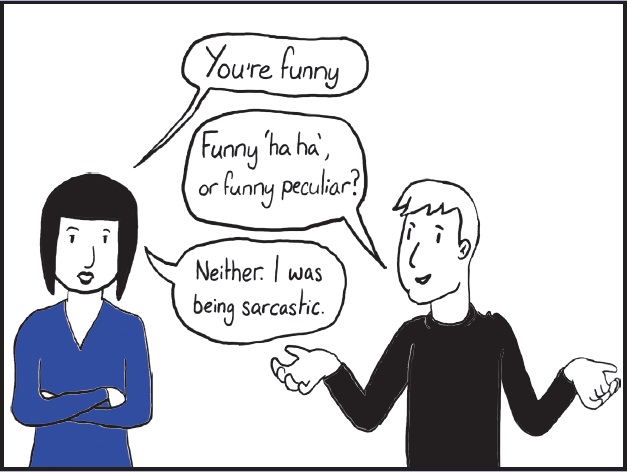24
Be More Sarcastic
“Sarcasm is the lowest form of wit.”
Oscar Wilde
The trouble with the quote above is, that it's only part of the quote. What Oscar Wilde actually said was, “Sarcasm is the lowest form of wit but the highest form of intelligence.” And as a pretty sarcastic man himself, I think maybe the first part of the quote was meant sarcastically.
But for me the interesting part of the quote is that it's “the highest form of intelligence”, because understanding sarcasm actually requires many processes in the brain.
An Israeli team led by Dr Simone Shamay-Tsoory at the Haifa University compared healthy people alongside people with damaged brains and found that damage to the prefrontal lobes at the front of the brain can stop you understanding sarcasm.
She said this fitted with what is already known about the anatomy of the brain. Language areas on the left hand side of the brain interpret the literal meaning of words and the frontal lobes and the right side of the brain understand the social and emotional context.
The reason that sarcasm requires all these different parts of the brain is what makes it a powerful tool. Because being sarcastic and also listening to someone being sarcastic actually makes you more creative, according to the study published in Organizational Behavior and Human Decision Processes journal.
A team of researchers from Insead Business School, and Harvard and Columbia universities, led by Dr Li Huang, carried out a number of studies involving more than 300 men and women. Each was designed to test the effects on subsequent creativity after making and receiving sarcastic comments.
One of the main experiments involved people being exposed to sarcastic or sincere comments and then faced with a psychological test involving creativity.
The results showed that sarcasm had a huge impact on the participants' ability to solve the problem. Of those who had been the butt of sarcastic comments, 75% came up with the right solution, compared with only 25% who had been exposed to sincere comments. Some 64% of those who made sarcastic comments were correct too, compared with 30% of a control group.
That's double the performance for people making sarcastic comments and treble for people on the receiving end. Being on the receiving end is no doubt higher because working out what's sarcastic uses more of the brain than simply being sarcastic.
Understanding sarcasm requires comprehending contradictory statements, for example “Don't work too hard” said to someone who is clearly resting. This puts the brain into abstract thinking mode, and the researchers said that there is decades of work to show that abstract thinking increases creativity.
“We have shown that creativity is enhanced following all types of sarcasm, from sarcastic anger and criticism to sarcastic compliments and banter,” the researchers said. “All forms of sarcastic exchanges, not just sarcastic anger or criticism, seem to exercise the brain more.”
Health and Safety
The trouble is sarcasm is often to used to convey thinly disguised disapproval, contempt and scorn. Even if it makes you more creative, these aren't very productive and helpful emotions to have at work.
One of the researchers, Francesca Gino, said: “Our research proposed and has shown that to minimize the relational cost while still benefiting creatively, sarcasm is better used between people who have a trusting relationship.”
If it's amongst work colleagues and friends with whom you have a good relationship, then it's a healthy way to put your brain into abstract thinking mode and make you more creative. But if it's contemptuous or angry sarcasm, the negative emotions it creates outweigh the creative benefits.
Here are a few examples:
Contempt
Boss to Employee:
Resentment
Boss:
Employee:
Friendly banter
One colleague to another:
Using sarcasm to purposely make people feel uncomfortable is definitely the lowest form of wit. Using sarcasm to tell a colleague in an unpatronizing way that you understand their plight, knowing that it'll also make you both more creative, is the highest form of intelligence.

